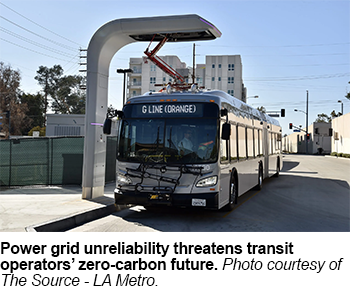Association Co-sponsors AB 463 (Hart) and AB 719 (Boerner Horvath) to Improve Electricity Reliability and Medi-Cal Reimbursements for Transit Agencies
By Jacob Herson
Managing Editor
Transit California
The Legislature has introduced the highest number of bills by the bill introduction deadline in over ten years: 2,632 pieces of proposed legislation. The California Transit Association is co-sponsoring two bills critical to the future of public transit and tracking many more. Assemblymember Gregg Hart (AD-37) introduced AB 463 Electricity: prioritization of service: public transit vehicles. Existing law requires the California Public Utilities Commission (PUC) to establish an order of priority among the customers of electricity and gas providers and among those customers’ uses of electricity and gas based on the public benefit. If utility providers are temporarily unable to meet the demands of all their customers, the PUC uses this established order of priorities to determine how electricity and gas is rationed among different customers and uses.

AB 463 would require the PUC, in establishing those priorities, to consider the economic, social equity, and mobility impacts of a temporary disruption in electrical service to public transit operators. With the mandate to transition to zero-emission operations, public transit operators will be increasingly reliant on electricity. The bill would also require electricity providers to include the impact to public transit electric vehicle charging infrastructure in their already-required wildfire mitigation plans.
“Accessible, efficient, and resilient public transportation is critical to meeting California’s ambitious climate goals and to providing mobility for our State’s transit-dependent residents,” said Assemblymember Hart. “AB 463 is an important step in building resilience into our public transportation infrastructure. Members of our community who rely on public transportation need the reassurance that services will remain stable during flex alerts or public safety power shutoffs.”
The Assemblymember continued: “During emergencies, public safety officials need to know transit buses will be available to support disaster response. By prioritizing public transportation during grid disruptions and power shutoffs, the bill would protect the health and safety of our communities,” said Hart.
The Association is co-sponsoring AB 463 with the Alameda-Contra Costa Transit District (AC Transit). Assemblymember Hart said, “Our sponsors represent a broad coalition of transit agencies with the technical expertise and real-world experience to work effectively with California’s public utilities to ensure stable, reliable transit service during grid disruptions and natural disasters. I am proud to have them as sponsors and am excited to work together on getting this bill to the finish line.”
AB 463 passed out of the Assembly Utilities and Energy Committee on March 22.
Assemblymember Tasha Boerner Horvath (AD-77) introduced AB 719 Medical Benefits. Under existing law, the Medi-Cal program is administered by the State Department of Health Care Services and, in part, governed and funded by federal Medicaid program provisions. Existing law includes nonmedical transportation to obtain covered Medi-Cal services among the benefits provided to beneficiaries.
AB 719 would require managed care plans to contract with public transit operators to establish reimbursement rates for nonmedical and nonemergency medical transportation trips provided by a public transit operator. The bill would require the rates reimbursed to be based on the department’s fee-for-service rates for nonmedical and nonemergency medical transportation service.
Assemblymember Boerner Horvath explained: “Public transit operators provide non-medical transportation mandated by federal law for medically necessary Medi-Cal-covered services like traveling to doctor’s appointments, picking up prescriptions that cannot be mailed, or picking up medical supplies like prosthetics, orthotics, and other equipment.”
“Transit operators are supposed to be reimbursed for these trips. Managed care plans receive the reimbursements for these services directly, but changes to the law in 2016 eliminated the requirement that ensured the payments made their way back to the public transit operators providing the service,” said the Assemblymember.
Boerner Horvath continued: “I authored AB 719 because public transit operators should not have to bear the full cost of providing the service when there are funds specifically allocated to help cover it.”
The Association is co-sponsoring this bill with the San Diego Metropolitan Transit System. “The California Transit Association is the champion of public transit in our state and we know that public access to transportation improves our communities, strengthens the economy, and is better for our environment,” said Boerner Horvath. “Non-medical transportation for this population provided by public transit operators is a vital service, and often their only affordable option to access care. The California Transit Association’s advocacy on AB 719 provides a key voice on this important issue that my colleagues in the Legislature will listen to,” said the Assemblymember.
This bill will be heard in the Assembly Health Committee on April 11.
The Association is tracking several other pieces of high-priority legislation, many of which are re-introductions of measures from the 2022-23 Legislative Session. For more information, see our March 30 Legislative Bulletin.